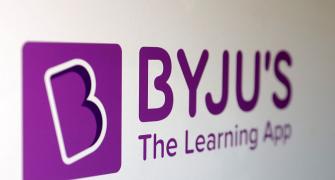The edtech major promised a learning revolution, offering hope to millions of under-educated youth. Now, those dreams are shattered, observes Devangshu Datta.

The latest shenanigan at edtech giant Byju's is an extraordinary general meeting where sundry shareholders try to oust founder CEO Byju Raveendran and his family. That power struggle is hardly the only issue with the company.
Byju's faces an Enforcement Directorate probe for alleged forex violations.
It filed FY22 (year ended March 2022) financials late, in November 2023, reporting losses of Rs 8,245 crore (Rs 82.45 billion) on revenues of Rs 5,298 crore (Rs 52.98 billion).
This follows losses of Rs 4,558 crore (Rs 45.58 billion) on revenues of Rs 2,298 crore (Rs 22.98 billion) in FY21.
It faces litigation in the US from lenders suing to recover $1.2 billion, and its US subsidiary has declared bankruptcy.
It has reportedly sacked over half its employees -- at its peak, it had 60,000. It has problems paying those who remain.
In January 2024, it floated a rights issue to raise $200 million. That rights issue was at an implied valuation of between $225 and 250 million.
This is a far cry from Byju's peak valuation of $22 billion in March 2022. Byju's has spent at least $2.5 billion in an acquisition and expansion spree, and now it's finding it difficult to pay salaries!
The marque investors who had pumped in cash earlier have pulled their representatives from the board.
The auditor, Deloitte, has also quit. There are allegations the Raveendran family sold large stakes, in off-market deals, while the going was good.
That's quite a train wreck -- from being the world's most highly valued edtech unicorn to losing 99 per cent of that value in less than two years.
These things happen in the tech and startup ecosystem, though they are rarely as spectacular. But Byju's spent enormous sums to build a brand -- including sponsoring the Indian Premier League and the football World Cup. It's no exaggeration to say it's a household name. So the collapse is equally high-profile.
The tech ecosystem has had its share of scams and scandals -- think Satyam, or Theranos -- so that too is not unusual.
We've seen a less spectacular version of this sort of collapse earlier, when Educomp, a listed edtech company, soared to heights before going bankrupt.
What is unusual is the industry that Byju's (and Educomp) occupied. Education is not an industry in the normal sense -- indeed schools and colleges are non-profits.
Edtech delivers education using digital technology, so while edtech is for profit, it services a non-profit sector.
Byju's was, by far, the largest and best funded edtech in India, maybe the world.
The implosion will bury edtech, so far as investor funding is concerned, for years, if not permanently.
That is heartbreaking and it has policy implications that go beyond the negative externalities that result when a large business collapses.
Byju's positioned itself as the solution to a huge, unmet need. India has an under-educated population struggling for access to better education.
Conventional schools and colleges lack the capacity to fill that gap. Hence, the desperate competition to get into engineering and medical courses.
On average, most of India's workforce has 10 years of schooling or less.
The average school student has very poor reading or numeracy skills, according to Pratham's surveys. Hence, the popularity of private tuition and the mushrooming coaching centres.
Every Indian family, regardless of religious affiliation, worships at the altar of education.
Every lower-income family knows it is the only honest way to climb the ladder.
Byju's exploited that genuine need and that insecurity to sell courses.
Parents scraped together the resources to sign up their children. But because Byju's did not deliver what it promised, the users have lost years of their lives learning little, while parents have lost hard-earned money and, in many cases, they're struggling to repay loans.
Edtech offered hope that under-educated youth could leverage it to learn skills they did not acquire in classrooms.
This is in analogy to the way fintech has pulled unbanked millions into the formal financial system.
A valuation of any business is based on projections of future earnings.
The collapse of Byju's valuation and the impact on edtech funding pulls down the 'valuation' of the demographic dividend.
An under-educated population will earn less, which means lower gross domestic product growth through coming decades. That cold equation will translate into misery for millions.
Disclaimer: These are Devangshu Datta's personal views.
Feature Presentation: Rajesh Alva/Rediff.com










